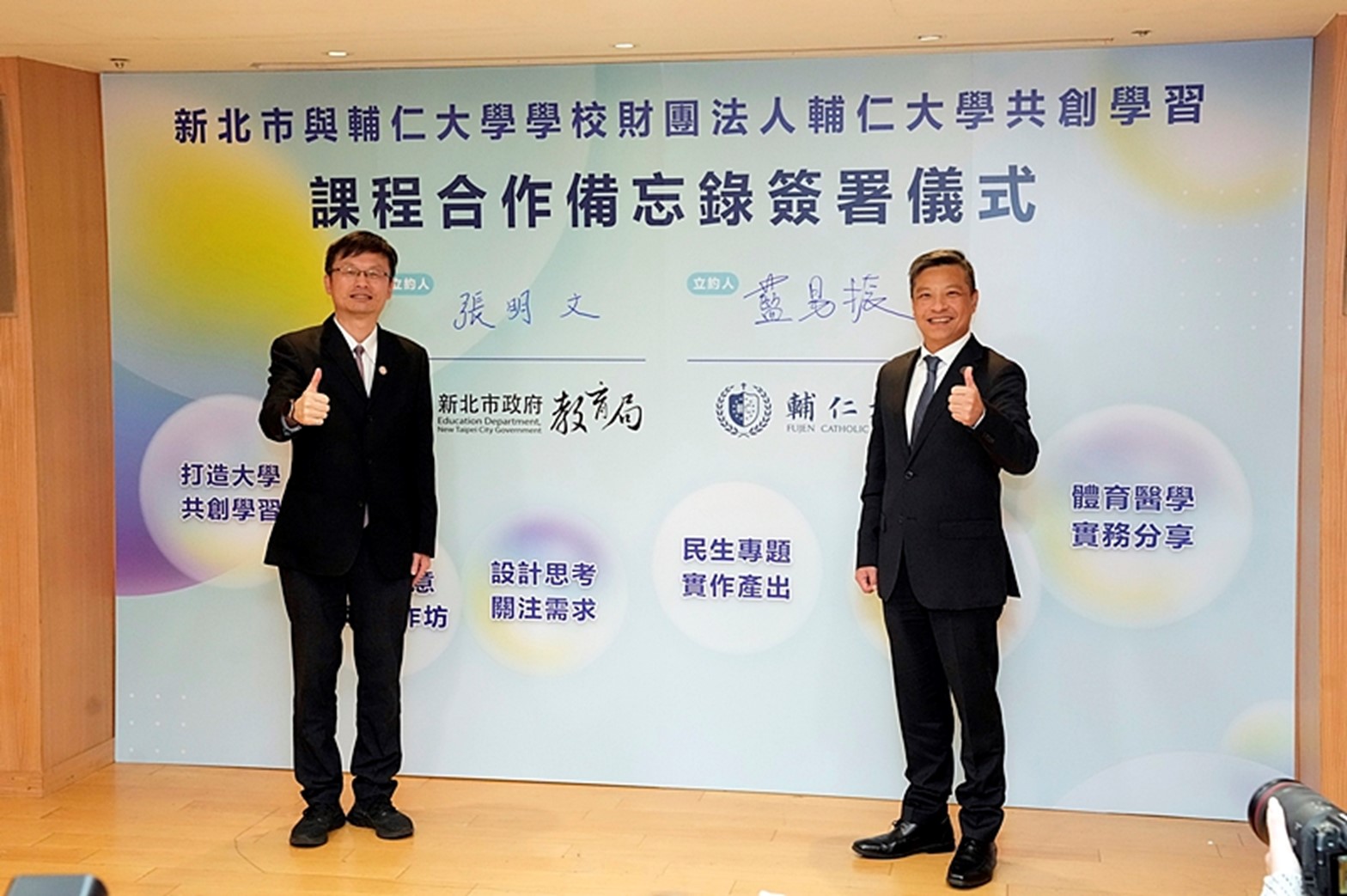2024/04/02
FJCU and New Taipei Education Department sign MOU
On March 22, Fu Jen Catholic University (FJCU) and the New Taipei City Government Education Department jointly signed a Memorandum of Understanding (MOU) to combine the learning resources of the College of Human Ecology, College of Education, and College of Interdisciplinary Studies to collectively enhance the quality of compulsory, diverse elective, self-directed learning, and learning portfolio courses in New Taipei City high schools. The signing ceremony was held at the New Taipei City Government Office, attended by Director Chang Ming-wen of the Education Department, principals from several high schools, as well as FJCU President Lan Yi-chen, Vice President for Academic Affairs Wang Ying-chou, Director of the Office of Academic Affairs Tsai Tsung-yu, Director of the College of Fashion and Textiles Ho Zhao-Hua, and Director of the Department of Food Science Hsieh Rong-feng. Director Chang Ming-wen jokingly remarked upon seeing the turnout from FJCU, “Has the entire university shown up? I am grateful to see the importance Fu Jen attaches to this cooperative project.”
The signed MOU includes 20 diverse types of holiday courses offered by FJCU. Director Chang Ming-wen highly praised this initiative, stating that FJCU is the largest comprehensive university in New Taipei City and is now sharing resources with all high school students in New Taipei City. Director Chang Ming-wen cited his own example, mentioning that when he was admitted to a teacher’s college, he was still unsure whether he really wanted to become a teacher. Therefore, he strongly encourages young people to go out and just try, as the many micro-courses provided by FJCU are an excellent opportunity to explore various interests. FJCU President Lan Yi-Chen expressed that as a university in New Taipei, FJCU must bear the local social responsibility, not just in education, but also in areas such as the campus located in the Wenzaizhen rezoning area, the future university city plan, and sustainability issues. FJCU will fully cooperate with the development needs.
The courses offered this time include one of Taiwan’s most discussed issues, food safety, with the College of Human Ecology offering four major types of courses, including the practical courses “Home Dining,” “Food Safety Expert,” “Fruit Production Expert,” and “Smart Design of My Healthy Plate,” for which 3D food printers were used. In terms of design thinking and creative thinking, the courses integrate five major topics: sustainable development, child and adolescent life, elderly life, smart healthcare, and art therapy. Through guided workshops and practical exercises, combined with thinking techniques such as board games, mind maps, and six thinking hats, the courses managed to spark inspiration and creativity as students and teachers discussed and worked on solutions to the needs of future society.
Currently, the most popular sports topics include sports medicine, sports science, and sports management, showing how athletes who have just won medals at the Asian Games correctly ingest food and supplement nutrition before, during, and after the competition, regulate psychological stress, and provide effective technical and tactical analysis through data collection technology. Furthermore, it establishes preventive measures, effective treatment, and functional reconstruction for sports injuries, and analyzes the current booming sports industry, providing students with diverse possibilities for future career exploration.
A second-year student of Danfeng High School, Chou Chih-ching, shared, “I have taken micro-courses offered by Fu Jen at school, and the university’s teaching staff has greatly helped us in choosing future majors and exploring careers. I look forward to participating in more exciting holiday courses in the future.” Fellow second-year student Chu Yu-hsien is also looking forward to participating in the practical courses offered by the College of Human Ecology, saying that this only allows him to personally produce different types of food but also enables him to understand the process and connotation behind the production of these foods.
